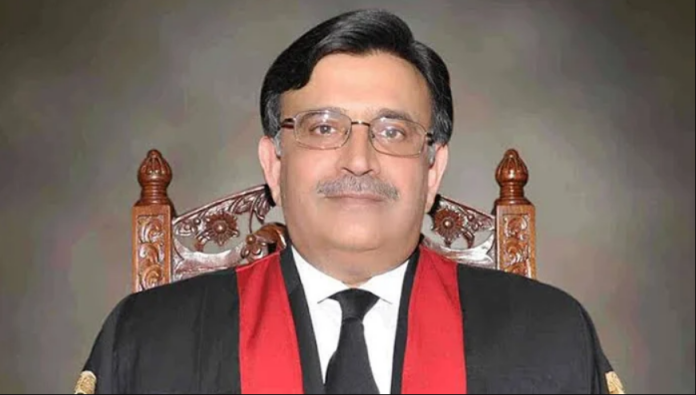By Asghar Ali Mubarak
ISLAMABAD: Chief Justice of Pakistan (CJP) Umar Ata Bandial said on Friday that the trial of those involved in May 9 violence should not begin in military courts without informing the Supreme Court (SC).
He made the remarks as a six-member bench, headed by him and consisting Justice Ijazul Ahsan, Justice Munib Akh-tar, Justice Yahya Afridi, Justice Sayyed Mazahar Ali Akbar Naqvi and Justice Ayesha A. Malik, resumed hearing a set of pleas challenging the military trials of civilians.
During yesterday’s hearing. Latif Khosa, the lawyer for petitioner Aitzaz Ahsan, stated that whatever was happening in the country today had taken place during the tenure of former military dictator Ziaul Haq.
“You can’t compare the present era with the era of Ziaul Haq. This is not Ziaul Haq’s era nor is martial law imposed in the country. Even if a martial law-like situation arises, we will intervene,” CJP Bandial said.
CJP Bandial said the SC should be informed before military trials of civilians begin. “The trial of the accused in military court’s should not begin without informing the SC,” he said.
At the previous hearing, the apex court had provided another opportunity to Attorney General for Pakistan (AGP) Mansoor Usman Awan to seek fresh instructions from the government about the provision of appeal against the sen-tence to be awarded by military courts to those found guilty of May 9 violence and arson.
The observations came when the AGP said the government was willing to follow any suggestions to improve the pro-cess of trial by military courts if the SC issued directions to ensure provision of appeal against convictions and that the sentence should be awarded with reasons.
At the outset of the hearing, AGP Awan came to the rostrum and said that the apex court had issued him directives at the last hearing. He said that he had spoken about the “organised” plan behind the violent events of May 9.
“From the video clips shown in court, it is evident that a lot of people were involved in the events of May 9,” he said. “Despite the large number, after exercising caution, 102 people were pinpointed for court martial,” he said.
He reiterated that such an incident had occurred in the country for the very first time. He said that an airbase was at-tacked in Mianwali, adding that it could also have taken place at the ordnance factory.
“We have to prevent such incidents [from taking place] in the future,” the AGP said. “There is a difference between a civil crime and a crime committed by a civilian,” Awan said.
At one point, Justice Naqvi asked how it was decided who would be tried in military courts and who wouldn’t. Awan said that offences under Section 2(1)(d) of the Army Act would be tried in military courts.
“Is the Army Act outside the bounds of fundamental human rights?” asked Justice Afridi. The AGP responded in the affirmative, saying that fundamental rights were not applicable on the Army Act.
Awan argued that there was mention of the Army Act being applicable to civilians even before the 21st Amendment.
“From your arguments, it appears as if fundamental rights have ended,” Justice Akhtar remarked. He then proceeded to ask whether Parliament could amend the Army Act, to which the AGP replied in the affirmative.
“The law should be in context of fundamental rights,” Justice Akhtar said. “Your argument is that it is the state’s will to give or not give fundamental rights.”
“Fundamental rights can only be done away with through legislation. This about this,” CJP Bandial remarked. He ob-served that independence of the judiciary was a central part of Pakistan’s justice system.
“The SC had declared independence of the judiciary a fundamental right. We can’t leave everything to the trial court,” the CJP said.
“In 2015, the Constitution was pushed aside through the 21st Amendment. But that is not the case now,” he said.
The court observed that citizens were accorded fundamental rights under the Constitution and wondered how these could be removed through specific restrictions under the Army Act.
AGP Awan said he would first talk about the trial process in military courts before answering the questions posed by the apex court. He said that the commanding officer assigned to a particular area sends a report to the General Head-quarters (GHQ).
“Under the Army Act rules, an inquiry is initiated [and], in the next phase, the suspect’s custody is sought,” he said. He said that after seeking the suspect’s custody, a summary regarding the evidence is presented after which he is charged.
“If the commanding officer is not satisfied with the evidence, then he can dismiss the charges,” the attorney general said. He added that the suspect was given a choice to record his statement. “During the trial, the suspect can consult with a legal adviser,” he said.
CJP Bandial, however, observed that suspects were given very little time to defend themselves in military courts.
AGP Awan contended that under the Army Act, the decision in military courts was passed by a majority. In case of the death penalty, a two-thirds majority is required, he said. “Prima facie, no one out of the 102 suspects arrested will be sentenced to death or 14 years imprisonment,” he said.
Justice Akhtar then wondered if the AGP was trying to say that there was no case under Section 3A of the Official Se-crets Act. “Are you saying that such a case could emerge?” CJP Bandial asked the AGP.
“My statement is up till this stage,” AGP Awan responded as he assured the court that the verdicts issued by the mili-tary courts would have detailed reasons. He also told the apex court that the government had decided to have an open trial of the accused in military courts.
“The accused’s lawyer and family members of can see the full trial.” the AGP said.
He went on to say that after the suspect was sentenced, there was also the confirmation phase. “Before the confor-mation, a review is undertaken to see whether or not the trial was according to the law,” he said.
AGP Awan said that the accused would be allowed legal representation, adding that he could also seek the services of a private counsel. He said that Section 133 of the Army Act was there to appeal the verdict of military courts.
“For a punishment that is more than three months, an appeal can be sought within 42 days,” the attorney general said, adding that the plea could be filed in a court of appeal.
“The Pakistan Army is so far investigating the events of May 9. Up till now, the trial of any accused in military courts has not yet started,” the AGP said.
Regarding the right of appeal, the AGP sought more time to ponder this question. “This matter needs careful consid-eration,” AGP Awan said. Referring to the case of Indian spy Kulbhushan Yadav, he said, “We have to act in such a way that the country’s position is not affected.”
The AGP then sought one-month’s time from the SC on this matter, and the hearing was adjourned indefinitely.




